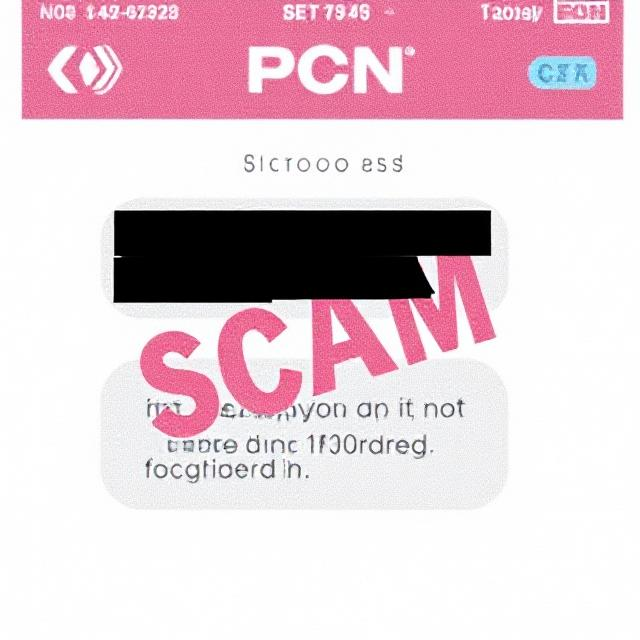PCN Text Scam: How to Identify and Protect Yourself from Fraudulent Messages
In today’s digital world, scams and fraudulent activities have taken on many forms, and one of the most concerning is the PCN text scam. This type of scam targets users through deceptive text messages that aim to steal personal information, money, or both. In this article, we will delve into the details of what the PCN text scam is, how it works, and the steps you can take to protect yourself from falling victim.
What is a PCN Text Scam?
PCN, which stands for Payment Confirmation Number, is often used in legitimate communications related to transactions or services. However, cybercriminals exploit this term to trick individuals into believing they are receiving legitimate updates regarding payments, orders, or service confirmations. The scam usually involves a text message that appears to come from a trusted organization, such as a bank, government agency, or online retailer.
The scam text typically contains a PCN number and asks the recipient to click on a link or provide further details to “confirm” a payment, order, or transaction. Sometimes, the message may mention that an issue needs to be resolved immediately or that action is required to avoid penalties.

Here’s a common example of a PCN scam message:
“Your recent payment has been flagged as incomplete. Please confirm your Payment Confirmation Number (PCN) to avoid account suspension. Click the link to resolve: [scam link].”
The link in the message leads to a fake website that looks legitimate, often mimicking the official page of a bank or service provider. On this site, users are prompted to enter sensitive information such as credit card numbers, login credentials, and other personal details. Once submitted, the information is captured by the scammers, leading to identity theft, unauthorized transactions, or financial loss.
How Does the PCN Text Scam Work?
The PCN scam is typically carried out in a few key stages:
- Scammer Preys on Trust: The text appears to be from a reputable source, such as a bank or e-commerce site, which helps lower the victim’s defenses. The use of terms like “PCN” and “confirmation” makes it sound official.
- Urgency and Fear Tactics: The message usually creates a sense of urgency, claiming that failure to act immediately could result in financial consequences or account suspension. This fear tactic pushes victims to act quickly without thinking critically.
- Fake Website or Call: The link included in the text takes the victim to a fake website. These sites are designed to look almost identical to legitimate platforms, making it difficult for users to spot the difference.
- Data Collection: Once on the fake site, the victim is asked to provide sensitive information, which is then stolen by the scammers. This can include financial details, passwords, or personal identification numbers (PINs).
- Financial Exploitation: After obtaining the victim’s information, scammers can use it for various purposes, such as draining bank accounts, making unauthorized purchases, or committing identity theft.
Identifying a PCN Text Scam
Recognizing a PCN text scam can be tricky, but there are several red flags to watch for:
- Suspicious Sender: Check the sender’s phone number or email address. Scammers often use random or unfamiliar numbers that don’t match the official ones of the organization they claim to represent.
- Too Good or Too Urgent: If the message includes a sense of urgency or promises too-good-to-be-true rewards, it’s a red flag.
- Poor Grammar or Spelling: Legitimate organizations usually send well-written messages, so any text with spelling mistakes or awkward phrasing is a cause for concern.
- Unsolicited Links: If you didn’t initiate the transaction, be cautious of unsolicited messages that contain links, especially if the link doesn’t lead to a legitimate website.
- Requests for Personal Information: Be suspicious of messages asking for sensitive data, such as passwords, social security numbers, or credit card details.
How to Protect Yourself from PCN Text Scams
While scammers are constantly adapting their tactics, there are several steps you can take to protect yourself from falling victim to a PCN text scam:
- Don’t Click on Suspicious Links: If you receive a message containing a link, avoid clicking on it directly. Instead, visit the official website of the company or organization through a search engine and log in to check for any issues with your account.
- Verify the Source: If the text message claims to be from a known company or service, contact them directly using a verified phone number or email address (not the contact info provided in the text) to confirm if they sent the message.
- Use Two-Factor Authentication (2FA): Enable 2FA on your accounts whenever possible. This extra layer of security makes it much harder for scammers to access your accounts, even if they have your password.
- Report the Scam: If you receive a suspicious text message, report it to your phone carrier and the company that the scammer is impersonating. This can help prevent others from falling victim to the same scam.
- Be Cautious with Personal Information: Never share sensitive personal information via text message or email unless you are absolutely sure about the identity of the requester.
- Use Anti-Phishing Software: Some security software can help detect phishing attempts, including fake websites and malicious links, before they cause any harm.
Conclusion
PCN text scams are a growing threat in the digital age, but by staying vigilant and informed, you can reduce the risk of becoming a victim. Always double-check the legitimacy of any unsolicited text messages, especially those that ask for sensitive information. Remember, when in doubt, it’s best to take a step back and verify the source before taking any action. By following these simple steps, you can help protect your personal data and avoid falling victim to scammers.
Frequently Asked Questions (FAQ) about PCN Text Scams
1. What is a PCN Text Scam?
A PCN Text Scam is a type of phishing scam where scammers send fraudulent text messages claiming to be from reputable organizations like banks, government agencies, or online retailers. These messages include a Payment Confirmation Number (PCN) or similar language to trick users into clicking on malicious links or providing sensitive personal information.
2. How can I identify a PCN Text Scam?
- Unsolicited Texts: If you did not initiate any transaction or inquiry, be suspicious of unexpected messages.
- Suspicious Links: Scam messages often contain links that direct you to fake websites designed to steal your personal information.
- Urgency or Threats: Scammers often create urgency, claiming you need to act immediately to avoid penalties or account suspension.
- Poor Grammar: Many scam texts contain spelling errors or awkward phrasing.
- Unknown Sender: The sender’s phone number or email address may look unusual or unfamiliar.
3. What should I do if I receive a PCN text message?
- Do not click the link or respond to the message.
- Verify the source: Contact the company directly using official contact methods (such as a website or phone number you know is legitimate).
- Delete the message: If you confirm the message is a scam, delete it immediately.
4. Is it safe to visit the link in a PCN text message?
No. Clicking on a link in a scam message is unsafe and can lead to phishing websites that will attempt to steal your personal or financial information. Always double-check the legitimacy of any link before clicking on it.
5. How do scammers benefit from PCN text scams?
Scammers benefit by stealing personal information such as usernames, passwords, credit card details, and other sensitive data. This information can then be used for financial theft, identity theft, or unauthorized transactions.
6. What are some signs that a PCN text scam is fake?
- The message includes unknown phone numbers or email addresses.
- The link appears to be incorrect or suspicious.
- The message demands immediate action to avoid serious consequences.
- The text asks for personal or financial information that you would not normally be asked to provide via text.
7. How can I protect myself from PCN text scams?
- Avoid clicking on links from unknown sources.
- Verify the authenticity of the message by contacting the organization directly.
- Enable two-factor authentication (2FA) for online accounts.
- Report scams to your service provider or the relevant company.
8. Can a PCN text scam steal my money directly?
While a PCN scam itself may not directly steal money, it can lead to theft if you provide your financial details (such as credit card or bank account numbers). Scammers can use this information to drain your accounts or make fraudulent transactions.
9. Should I report a PCN text scam?
Yes, reporting scams is crucial in preventing further victims. You can report the scam to your mobile carrier, the company being impersonated, and any relevant consumer protection or cybersecurity organizations.
10. What should I do if I’ve already clicked on a link in a PCN text?
- Change your passwords for any accounts that may have been compromised.
- Contact your bank or credit card company to report any potential fraud.
- Monitor your accounts for unusual activity.
- Install antivirus or anti-malware software to scan for any malicious programs.
11. Are PCN text scams only used for financial fraud?
No. While financial theft is a common goal, scammers may also use PCN scams to gather information for identity theft, access to accounts, or to install malware on your device.
12. How can I tell if a website is fake or legitimate?
- Look for “HTTPS” in the website URL, which indicates a secure connection.
- Check for spelling and grammatical errors on the website.
- Verify the website’s contact information and cross-check it with the official sources.
- Use an online tool to check the website’s legitimacy or look for reviews.
13. What is the role of a “Payment Confirmation Number” (PCN) in a scam?
The term PCN is commonly used in legitimate transaction processes to confirm payments. Scammers use this term to make their messages appear credible and urgent, fooling recipients into believing they are dealing with a genuine transaction.
14. Can mobile carriers block scam texts?
Yes, many mobile carriers offer services to block or filter out scam messages. Contact your carrier to inquire about blocking unwanted or suspicious texts.
By staying vigilant and informed, you can significantly reduce the risk of falling victim to a PCN text scam. If in doubt, always take extra time to verify the authenticity of any unsolicited communication.







